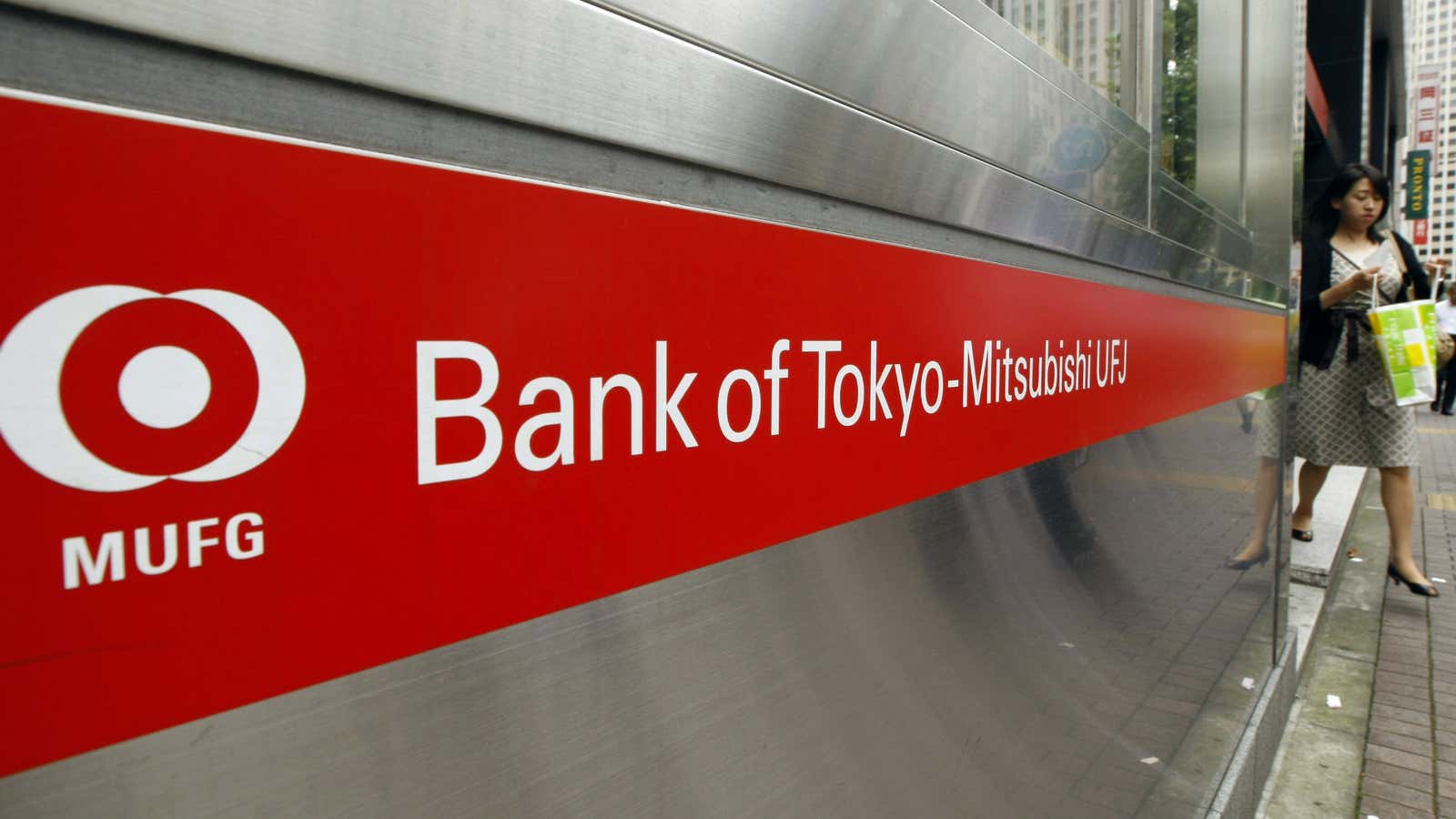As the saying goes, the cover-up is often worse than the crime.
That seems to be the lesson of the latest fine levied against Bank of Tokyo-Mitusbishi UFJ (BTMU), which was hit today by New York’s financial regulator with a $315 million penalty. That’s on top of a $250 million fine by the same regulator last year for breaking US sanctions on doing business with Iran, Sudan, and Burma.
The fine today is for misleading the New York financial watchdog during its investigation of the sanctions-busting case, in particular pressuring a consulting firm, PricewaterhouseCoopers, into “watering down a supposedly objective report” on the bank’s sanctions transgressions, according to a statement from the New York Department of Financial Services (NY DFS). The bank’s anti-money laundering compliance officer has resigned under pressure from the regulator, which banned two other bank executives from conducting business in New York.
But perhaps most notably, the NY DFS order requires the Japanese bank to physically relocate its US anti-money laundering compliance division to New York. For all intents and purposes, this means giving the New York operation domain over nearly all of the bank’s dollar-based business.
Out-of-the-box regulation
For an industry that prides itself on its global reach, on its ability to shift money across borders with the push of a button, this is a somewhat remarkable restriction. The NY DFS is now dictating how a big global bank should structure its compliance operations (and putting staff across the river in New Jersey won’t do).
This is just the latest in a series of strong statements from the New York watchdog, which was formed in 2011 by a merger of agencies and charged with applying its mandate in America’s financial center more broadly than its sleepier predecessors. Benjamin Lawsky, the agency’s outspoken leader, has since levied some of the toughest penalties against global banks for breaking sanctions, manipulating financial benchmarks, and engaging in any number of other transgressions that big banks have been accused of in recent years. As with BTMU, the NY DFS has taken two bites of the apple with London-based Standard Chartered—the latest fine, in August, was for inadequate follow-up to its initial anti-money laundering settlement, in 2012.
The agency’s small size and young age allow it to act faster than other regulatory bodies, according to Lawsky. “We can test things out, do things out of the box,” he recently told Bloomberg. Unsurprisingly, this hasn’t won him or his agency friends among bankers, who complain about increasingly complex and unpredictable settlements thanks to overlapping state, federal, and international agencies that come to different conclusions about how to penalize banks’ various misdeeds.
It’s a small world after all
Banks’ critics say that they deserve whatever punishment they get. But one of the inadvertent consequences of the push to better monitor the behavior of big banks seems to be the steady deglobalization of the industry, with today’s settlement in New York the latest chapter in a long saga. Regulators are increasingly wary of allowing banks to put critical functions out of their sight.
“Given the clear issues we’ve seen in recent years with dollar clearing operations through New York, we believe that this could provide an industry-leading approach to US compliance that centralizes expertise and regulatory supervision,” Matt Anderson, Lawsky’s spokesman, tells Quartz.
BTMU released a statement (pdf) today about the settlement. But the bank, through an outside spokesman, declined to comment on the relocation provision.
According to the consent order (pdf), BTMU kept a “sanctions screening filter” in Tokyo to flag dollar-denominated transactions containing language that would have aroused suspicion in the US, so that bank employees essentially could edit the wire messages before they reached New York. “In this way, payment messages that would have required further review—and potentially blocking or freezing—in New York, instead bypassed OFAC filters in New York,” the consent order says. (OFAC refers to the US Treasury Department’s Office of Foreign Assets Control.)
Forcing the bank to relocate compliance staff to New York “provides greater clarity and oversight over the bank’s operations in this area,” Anderson says.
The impetus for the geographically specific punishment for BTMU can be traced to the NY DFS’ role in a blockbuster $9 billion settlement with France’s BNP Paribas in June for—what else—breaking sanctions. This is the key passage in the agency’s case against the bank:
Compliance staff at the New York Branch operated knowing that they did not have adequate legal and compliance authority to ensure that activities conducted from BNP Paribas offices outside of the United States complied with New York and U.S. laws and regulations. This practice was intentional.
Ahead of its settlement with various US regulators, including NY DFS, BNP Paribas said it had introduced “new robust compliance and control procedures,” including routing all dollar flows through its New York branch as well as creating a new department—also in New York—to “ensure that BNP Paribas complies globally with US regulation related to international sanctions and embargoes.” Now, after BTMU was caught breaking the rules, NY DFS is ordering the Japanese bank to build up a very similar sounding operation in New York after the fact.
But aren’t there competent compliance professionals who can oversee and enforce US rules from Tokyo, London, Frankfurt, Hong Kong, or any other well-connected global financial center? As far as New York regulators are concerned, the answer would appear to be no.
